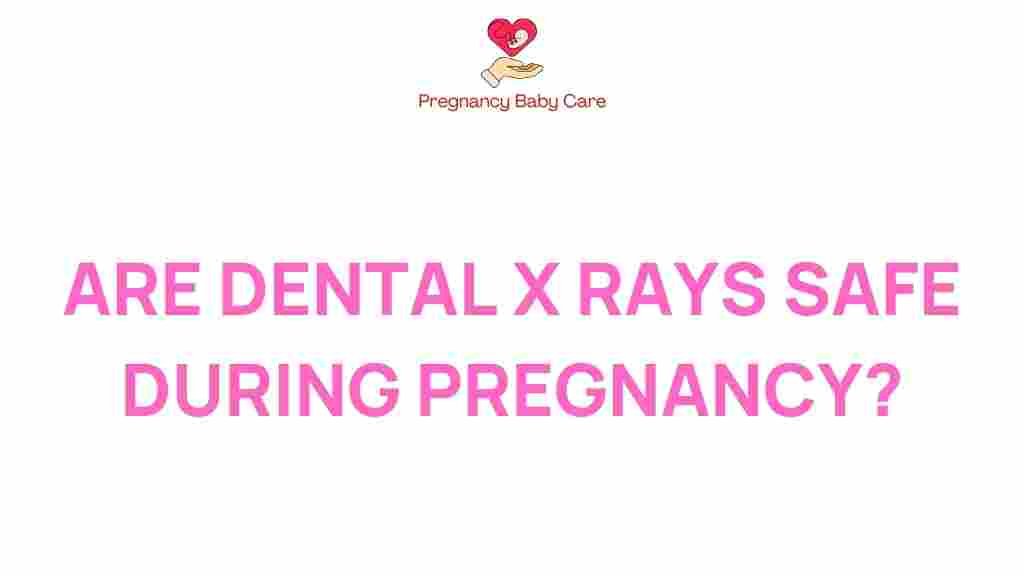Are Dental X-Rays Safe During Pregnancy?
Pregnancy brings a host of changes and considerations for expectant mothers, especially regarding health and wellness. One common concern is whether dental x-rays are safe during pregnancy. This article will delve into the safety of dental x-rays, the importance of maintaining oral health during pregnancy, and the guidelines surrounding radiation exposure.
The Importance of Dental Health During Pregnancy
Maintaining dental health is crucial for expectant mothers. Pregnancy can increase the risk of dental issues due to hormonal changes that can affect gums and teeth. Here are some reasons why dental health is essential during this time:
- Hormonal changes: Increased levels of hormones can lead to gum disease.
- Increased risk of cavities: Pregnancy cravings for sugary foods can contribute to tooth decay.
- Link to preterm birth: Poor oral health has been linked to complications such as preterm labor.
For these reasons, regular dental check-ups are recommended during prenatal care. But how do dental x-rays fit into this picture?
Understanding Radiation Exposure
One of the primary concerns surrounding dental x-rays during pregnancy is radiation exposure. Dental x-rays typically involve a very low level of radiation, especially when compared to other medical imaging techniques. Here are some key points about radiation exposure:
- Low radiation levels: Dental x-rays emit significantly lower levels of radiation than other types of x-rays, such as chest x-rays.
- Protective measures: Dentists use lead aprons and collars to protect the abdomen and thyroid during x-rays.
- Guidelines from health organizations: Many dental health organizations and medical guidelines state that the risk of not treating dental issues during pregnancy outweighs the minimal risk posed by x-rays.
When Are Dental X-Rays Necessary During Pregnancy?
Dental x-rays may be necessary during pregnancy in certain situations, including:
- Severe dental pain: If an expectant mother experiences significant pain, x-rays may be required to diagnose the issue.
- Infection: Dental infections can pose risks to both the mother and the baby; diagnosing these infections may necessitate x-rays.
- Ongoing dental treatment: If an expectant mother is already undergoing treatment, x-rays may help guide the process.
In these cases, it’s essential to communicate with the dentist about the pregnancy to ensure that appropriate measures are taken to minimize any risks.
Step-by-Step Process for Expectant Mothers
For expectant mothers considering dental x-rays, here’s a step-by-step guide:
- Consult your healthcare provider: Before any dental visit, inform your doctor about your pregnancy and discuss any dental issues you’re experiencing.
- Schedule a dental appointment: If you have dental concerns, book an appointment with a dentist who is experienced in treating pregnant patients.
- Discuss the need for x-rays: During the appointment, discuss the necessity of x-rays with your dentist and express any concerns you may have about radiation exposure.
- Use protective measures: If x-rays are deemed necessary, ensure that protective gear is used to shield your abdomen and thyroid.
- Follow up on treatment: After x-rays, follow the dentist’s recommendations for treatment and maintain regular dental check-ups.
Medical Guidelines and Recommendations
Various medical organizations have provided guidelines regarding dental x-rays during pregnancy:
- American Dental Association (ADA): The ADA states that dental x-rays are generally safe during pregnancy when appropriate precautions are taken.
- American Pregnancy Association: This organization emphasizes that the benefits of diagnosing and treating dental issues usually outweigh the risks associated with radiation exposure.
- Radiological Society of North America: They highlight that dental x-rays use far less radiation than other imaging studies, making them safer for pregnant women when necessary.
Always consult with your dentist and healthcare provider to make informed decisions about your dental health during pregnancy.
Troubleshooting Tips for Expectant Mothers
Here are some troubleshooting tips for expectant mothers concerned about pregnancy safety and dental x-rays:
- Communicate openly: Always express any concerns regarding x-ray safety with your dentist.
- Know your rights: You have the right to refuse x-rays if you feel uncomfortable, but discuss the implications with your dentist.
- Seek alternative treatments: If dental work can be postponed until after pregnancy, discuss this with your dental provider.
- Stay informed: Research and stay updated on the latest medical guidelines regarding dental health and pregnancy.
Conclusion
In summary, dental x-rays can be safe during pregnancy when necessary, and the benefits of addressing dental issues often far outweigh the minimal risks associated with radiation exposure. Expectant mothers should prioritize their oral health as part of their overall prenatal care. Always consult with your dentist and healthcare provider to ensure that you make informed choices that prioritize both your health and the health of your baby.
For further information on maintaining oral health during pregnancy, you may find this resource helpful: American Pregnancy Association.
If you have more questions about dental care during pregnancy, don’t hesitate to reach out to your dentist or healthcare provider. Your dental health is an integral part of a healthy pregnancy!
This article is in the category Health and created by PregnancyBabyCare Team
